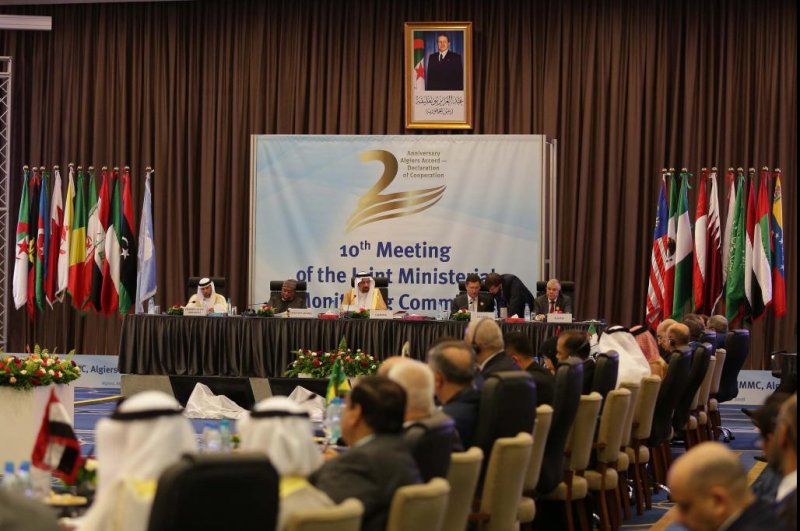The 10 OPEC and non-OPEC members of the Joint Ministerial Monitoring Committee meeting in Algiers on Sunday. Photo by STR/EPA-EFE
Sept. 24 (UPI) -- OPEC, Russia and other countries ignored U.S. calls to increase crude oil production, sparking a Monday rally that saw Brent futures soar past the $80 mark.
Brent futures were trading at $80.48 a barrel at noon Monday, up $2.24. That's the highest price for Brent since it touched $80 a barrel briefly in May. The last time prices were sustained at that level was 2014.
"This is the oil market's response to the 'OPEC+' group's refusal to step up its oil production," analysts at Commerzbank said Monday.
Leaders from the Organization of the Petroleum Exporting Countries joined leaders from Russia and other countries in Algiers to talk about keeping the market well supplied. Few details about how much output could be increased or when were released.
It's a tough balancing act with President Donald Trump calling for OPEC to increase production to push prices down.
Saudi energy minister Khalid al-Falih said the oil market is balanced and that its partners have increased production in response to rising prices.
"Whatever takes place between now and the end of the year in terms of supply changes will be addressed," al-Falih said. "The market is reasonably steady, and we should just be dynamic and responsive and responsible."
Bank of America raised its average Brent crude oil price forecast for 2019 from $75 a barrel to $80 a barrel Monday. That accounts for U.S. sanctions on Iran, which could wipe out 1 million barrels a day from the world market. The sanctions go into effect Nov. 5.
Venezuela could be the next country to see increased sanctions.
Iran threatens U.S., Saudi Arabia after attack
Saturday's terrorist attack on a military parade in Iran could have larger implications on Middle East stability and oil prices, experts say.
"We believe that Saturday's terrorist attack in Iran could prove to be the weekend's more consequential event as it will likely exacerbate the already dangerous Middle East antagonisms," Helima Croft, global head of commodity strategy at RBC Capital Markets, said Sunday.
Four gunmen ambushed a military parade Saturday, killing 29 people and injuring 70. The four attackers were killed. The victims included military personnel and civilians.
Iran's Supreme Leader Ayatollah Ali Khamenei blames U.S. allies in the region and promised "deadly and unforgettable revenge." There's concern that a larger war could break out.
"We also contend that the risk of a destabilizing clash will only grow as Iran comes to feel the full effects of economic sanctions that are designed to radically alter the behavior of the ruling regime, if not change it," Croft said.
U.S. officials have said they do not intend to change the Iranian regime.
U.S. crude oil exports are down
U.S. crude oil production set a new record over the summer producing 10.8 million barrels per day. But the American Petroleum Institute points out that during that time, exports fell 1.3 million barrels per day.
The U.S. trade balance between imports and exports widened during that time, with net imports reaching 4.54 million barrels per day in August, up 56 percent from two months prior.
API has been critical of Trump's trade war because it limits U.S. access to crude oil export markets and hinders the U.S. goal of energy dominance.
"Placing constraints on exports of American-made energy works against America's energy future," said API Chief Economist Dean Foreman. "As we produce more energy here at home, the U.S. needs markets for its products in order for our economy to continue to grow."















